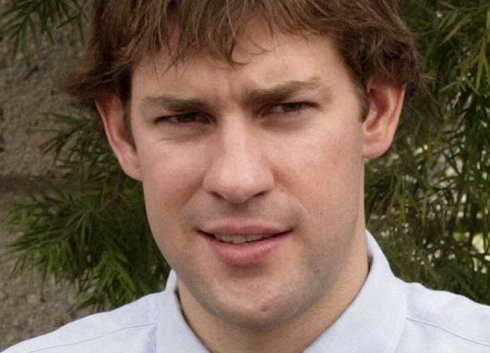Meghan Keane: 'The Office' is the Most Depressing Show on Television
by Meghan Keane

Have you watched The Office lately? The NBC series has become a microcosm of how depressing this recession can get-and not just because The Dunder Mifflin Paper company may fold in the next few episodes. That, after all, seems a fitting end for a company based on a business model that stopped being relevant in 1992. Instead, the show has taken the story of a man with a promising future and given him an interminable present.
In the last two seasons, our hero Jim Halpert won the girl, got the big promotion and upgraded to a suit. These were all things fans were happy about. It was encouraging. But wanting romantic tension to be relieved is never as satisfying as the relief.
The matrimony of Jim and Pam Beesly seemed the logical conclusion to a show where half the humor comes from unspoken communications between Dunder Mifflin employees and the audience watching their ongoing documentary. After years of silent glances, quiet flirtations and knowing inside jokes, Pam and Jim were finally-finally-doing what we’d be hoping for all along. Gone were Pam’s poorly-thought-out engagement to her lackluster boyfriend Roy and the painful tug of allegiances between Pam and Jim’s one-time girlfriend Karen that tore apart audiences earlier in the show. Jim and Pam won out. Getting those two together at last seemed so right!
Then their wedding day came. The Office pulled out a pretty impressive mid-season episode for an event that usually serves as a finale. There was communal puking. There was an ill-advised group dance down the aisle. There were the secret vows that Jim pulled out to remind Pam-and fans-of Jim’s greatness.
Jim and Pam getting married did more than give Michael and excuse to hook up with Pam’s mom. It expanded the lens of The Office wide enough to reveal a disturbing fact: Jim and Pam don’t have any real friends.
Suddenly, a romance that seemed like the natural progression for two quietly charming people revealed itself to be much more depressing.
All of Jim and Pam’s witty asides and eyerolls in response to their officemates’ antics have stopped being expressions of untapped potential and started to look like passive-aggressive attempts to undermine their peers-who are the only people who will socialize with them.
For audiences, Jim-more so than Pam-has served as a pressure valve for all of the overstimulated personalities on the show by responding to his absurd coworkers the only rational way: with sarcasm and bafflement. The whole point of Jim was that he held the promise that at some point he would get his act together enough to break out of the confines of Dunder Mifflin. He’s the relatable protagonist for anyone (read: everyone) who has ever been trapped in a middling situation and found the only defense to be sarcasm and bemusement.
Now Jim has developed into the most depressing archetype: a mediocre man who has already realized his full potential.
Gone is Jim’s charming lack of enthusiasm for his job. Now he’s proving exactly where a lack of drive is likely to lead you-to the mediocrity of middle management, where one is gripped by the fear of losing whatever corner of inanity you’ve carved for yourself in the workplace.
Rather than rely on the fact that his intellect could capably get him a job at any other two dimensional office space Scranton, PA, has to offer, Jim is now terrified of losing his job-and his pressurized wall of status-at Dunder Mifflin.
In the end, it looks like Karen didn’t fare so badly after all. At least Rashida Jones has lived to sitcom another day, landing on the similarly themed Parks and Recreation, a show that suffers a bit from the same derivative inception as The Office, but has found new areas for humor in the Tracy Flick quality of characters that actually desire their middle management fate.
But on The Office, Jim has always succeeded despite his job. His ongoing competition with Rainn Wilson’s overzealous Dwight Schrute worked because Dwight didn’t care how his coworkers viewed him. The comedy of Dwight all depends on the fact that he is hopelessly obsessive about everything he does, while Jim won us over by trying least.
Now that Jim has some power, we are slowly learning that he doesn’t know how to use it. As Jim struggles to succeed in the workplace, the show butts up against the depressing fact that he is not very good at his job.
While Michael Scott is off in New York being used as a show pony to demonstrate Dunder Mifflin’s successes, Jim is back at home, making one of his underlings work in the supply closet.
Throwing a wrench in the inane procedural drama of office life is funny when you have nothing to gain from it. But overabusing power-or a lack of it-is just sad.
Watching Jim scrape to compete with Michael-a man who previously he had only mocked-brings a deep kind of embarrassment. It’s gotten to the point where Jim pushed his “comanager” into a koi pond to get a leg up with the brass during a lunch meeting. Any self-respecting guy would be embarrassed to put so much effort into embarrassing someone.
The only upside is that, with the building tension between Jim and Pam out of the way, some of the smaller characters are finally able to shine. Ed Helms, Ellie Kemper and Mindy Kaling especially have taken off running with the extra screen time they’ve been given.
And as he uncomfortably settles into his partitioned office, Jim’s story is starting to resemble the worst purgatory of 30-something life. Each subsequent episode now brings with it a reminder of Jim’s failure, the harsh reality that having dreams is no indication that you’ll ever achieve them. If there’s something more depressing than that-and less funny-I’d be hard pressed to find it in prime time.
Meghan Keane is a freelance writer.
